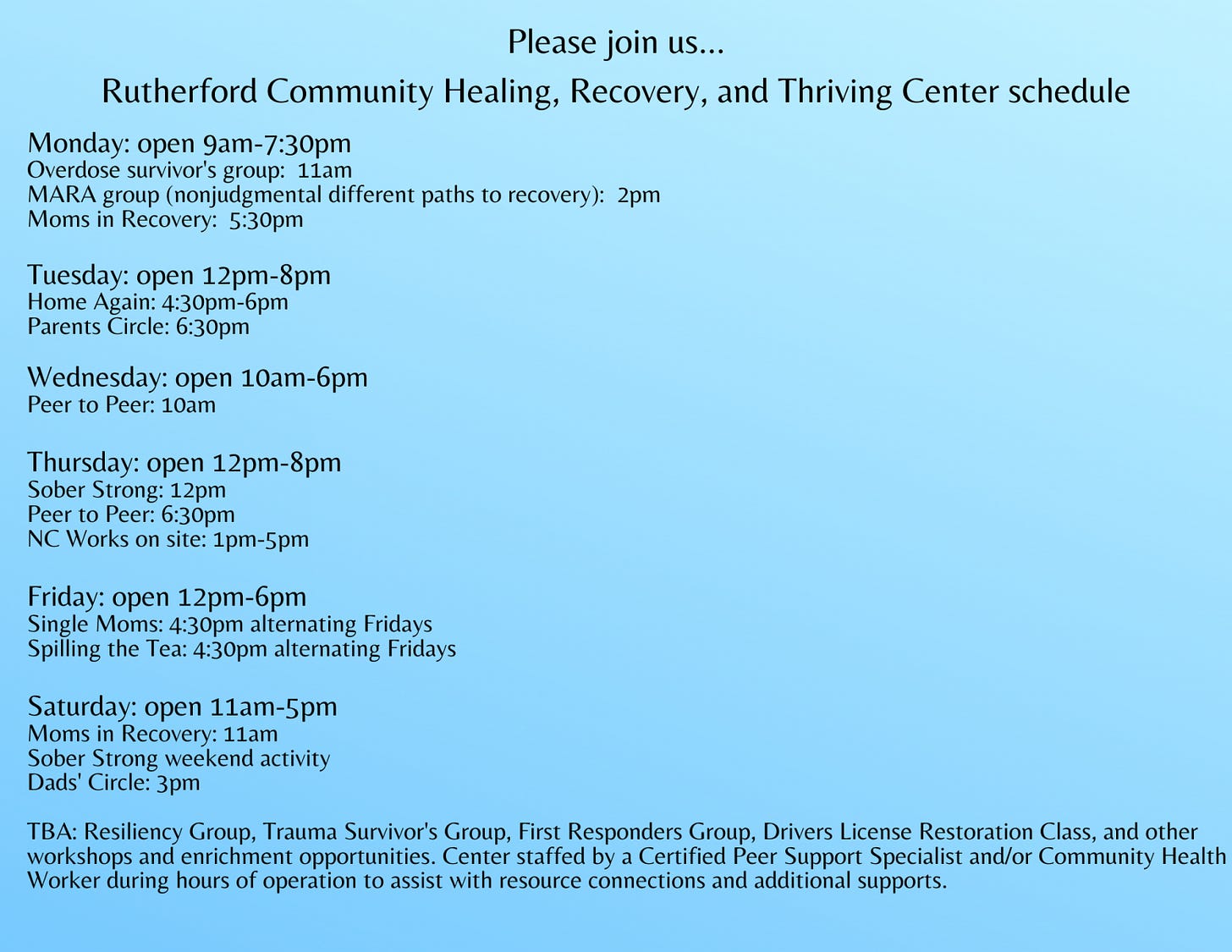To my new subscribers (and a reminder to loyal readers), welcome to Cops & Congress, where facts come first, followed by in-depth commentary and analysis. Paid subscribers enjoy exclusive access to scoops requiring investigation of public records. Your support directly funds the detailed research behind my independent journalism. (ICYMI: Six reasons to support my independent journalism)
Situational awareness: An exclusive, or scoop is an important news story that is first reported by a journalist. This goes beyond breaking news when no other journalists are known to be reporting on an important issue.
In the heart of Rutherford County, North Carolina, 54-year-old Marshall Craig Rippy has faced a series of hardships that have tested his resilience and faith. After maintaining sobriety for over two decades, Rippy relapsed following the death of his son, leading to a downward spiral that culminated in incarceration. Upon his release in August 2024, he was met with the foreclosure of his family home and the subsequent passing of his mother, leaving him homeless and in search of support.
The United States saw homelessness increase by over 30% in the past two years under the Biden administration, a dramatic rise driven mostly by a lack of affordable housing as well as devastating natural disasters and a surge of migrants in several parts of the country, federal officials said Friday.
"I relapsed after 20-something years," Rippy recounted. "Stayed high, dropped three years straight. Decided to get straight, cleaned up, had jail charges, but I just wanted to be straight."
Determined to rebuild his life, Rippy turned to United Way of Rutherford County, seeking assistance with housing and recovery services. He reached out to Aaron Watts, a peer support specialist at the organization, and Suzanne Porter, the executive director. Despite his persistent efforts, Rippy's pleas went largely unanswered.
"I talked to Aaron a couple more times," Rippy said. "I texted him on my phone. I told him, 'Aaron, they foreclosed on the home,' and he said, 'I'm sorry to hear that. If something comes up, I'll let you know.'"
On December 21, as temperatures dropped, Rippy found himself without shelter. He visited United Way's Healing and Recovery Center on Withrow Road, hoping to find refuge. To his dismay, the facility was closed during its advertised operating hours. Rippy texted Watts, explaining his situation and requesting assistance. Watts responded, stating, "I don't have any immediate solutions. Try Out of the Ashes. It will be after Christmas before I can do anything."

"I walked up there with everything I own and don't know what to do," Rippy recalled. "I've been homeless… and he tells me, on a freezing cold day, there's nothing he can do about me."
Adding to his frustration, Rippy observed individuals leaving the facility upon his arrival, seemingly avoiding interaction with him. "She (Porter) came to the door, looked directly at me, and then pulled out of the parking lot," he said. "She looked at me, said, 'Oh my God,' and drove away."
Rippy also raised concerns about the United Way’s use of funds from the national opioid settlement, which are intended to address substance abuse and support recovery efforts, and other federal grants. "Where’s the money going?" he questioned. "They’ve got millions coming in for opioids and recovery. I’m standing here, needing help, and it’s like they don’t even care. How’s that right?"
Rutherford County Commissioners awarded United Way of Rutherford County $258,000 in June under “option A” strategies (read the meeting minutes here and watch the video here.) The nonprofit participated in the county’s review of priorities, before being awarded the funds, according to documents on the state’s opioid settlement website dashboard. According to the resolution adopted by the county, funding began on July 1, 2024, to “increase program capacity, specifically in their Community Healing, Recovery and Thriving (HRT) Center.” United Way was also recently awarded $3M, but it is unclear what that will fund.
Rippy's experience raises questions about the accessibility and responsiveness of support services for individuals in crisis within Rutherford County. Despite his proactive efforts to seek help, he encountered barriers that left him feeling abandoned by the very organizations designed to assist.
"Show the love, help the people, do what you say that you do," Rippy said. "You want to see what I do? Walk with me. Talk with me."
Porter and Watts have not responded to an email request for comment. This reporter received an out-of-office holiday message from Porter, which said she would return to the office on January 2. However, on January 2 she is due in court for trial on cyberstalking charges against her critic, Leslie Lewis, who is also facing cyberstalking charges.
Rippy's story underscores the challenges faced by individuals seeking assistance in times of crisis and highlights the need for organizations to ensure their services are accessible and responsive to those in need.
"I'm not out here walking around on dope," Rippy emphasized. "I'm out here walking around because I got hope to get my life back to going."
In the absence of support from United Way, Rippy continues to rely on the kindness of friends and family, while striving to maintain his sobriety and rebuild his life. His resilience serves as a testament to the human spirit's capacity to endure, even in the face of systemic shortcomings.
"You pray for people like that," Rippy reflected on his interactions with United Way staff. "You can't judge them. You can't say nothing bad, you know. But that hurt."
As winter sets in, the plight of individuals like Rippy becomes increasingly urgent. The community's response to his story may well determine the effectiveness of local support systems and the willingness of organizations to fulfill their stated missions.
"Things gonna change," Rippy said with a note of hope. "I believe…Things gonna change."
For now, Rippy continues his journey, one step at a time, embodying the resilience and determination of those who refuse to be defined by their circumstances. His story serves as a call to action for communities and organizations to bridge the gap between intention and impact, ensuring that no one is left out in the cold.
🏛️ All those mentioned are presumed innocent until proven guilty.
Opinion & Analysis: Cops & Congress Commentary
United Way’s accountability gap leaves questions unanswered
In a time when opioid settlements have directed millions of dollars into communities for addiction recovery and support services, the lack of transparency and responsiveness from United Way of Rutherford County raises serious concerns. Rippy's heartbreaking story—of relapsed sobriety, personal loss, homelessness, and unfulfilled promises—reflects systemic failures that demand scrutiny.
For Rippy, his interaction with United Way was not just disappointing—it was dehumanizing. Left to fend for himself in cold weather after seeking aid from an organization explicitly tasked with helping those in crisis, Rippy's experience is emblematic of a troubling gap between public expectations and nonprofit accountability.
Opioid settlement funds: Who benefits?
One of the most pressing issues raised by Rippy is the allocation of funds from the national opioid settlement. With millions flowing into Rutherford County for recovery and support initiatives through various sources, why did Rippy—an individual actively seeking help to rebuild his life—find no available resources?
This raises critical questions:
How is the United Way managing these funds?
Are there clear, transparent processes in place for allocating resources to individuals in need?
Why did United Way representatives fail to offer immediate solutions?
The lack of clarity underscores a need for more stringent oversight, not only from within the organization but from community stakeholders and government entities responsible for disbursing these settlement funds.
When support systems fail
Nonprofits like United Way operate under the promise of community support. Their mission statements often include terms like “helping those in crisis,” “linkages to care,” or “fostering recovery.” Yet, when individuals like Rippy are met with locked doors and unreturned messages, it calls into question the efficacy of these missions.
Public trust is critical to any nonprofit’s success. If individuals in dire circumstances cannot rely on organizations like United Way to deliver, they lose faith—not only in those specific entities but in the broader network of support services.
Accountability begins with communication
Transparency isn’t just an ideal—it’s a necessity. When Rippy visited United Way’s HRT Center and found it closed during posted operating hours, he encountered not just an organizational failure but a fundamental breach of trust. I personally went there on Friday and confirmed that there was no posted note indicating a change in hours for Christmas. There is also no notice on their website.
Nonprofits must recognize that being stewards of public funds comes with a responsibility to communicate clearly, especially when facing scrutiny.
As taxpayers and community members, we deserve to know how funds are being used, who benefits from them, and what measures are in place to prevent individuals like Rippy from slipping through the cracks.
A call for oversight and reform
This isn’t just about one man’s story—it’s about the broader system. The opioid epidemic continues to devastate families and communities, and the funds meant to address this crisis must be used effectively.
Here’s what needs to happen in my view:
Independent audits: United Way should take the time to post their recent audits in readable formats. They shouldn’t post them upside down on their website. You can read the latest ones, rightside up, on my DocumentCloud.
Clear communication channels: Generally, organizations must establish reliable and timely ways for individuals to seek help—and receive answers.
Community accountability: Local governments and civic leaders must hold nonprofits accountable for their actions, especially when public funds are involved.
Hope in the face of adversity
Despite the failures he’s experienced, Rippy remains hopeful. "Things gonna change," he said, and we should all be working to make sure they do. His resilience is a reminder that even in the face of systemic shortcomings, individuals will continue to fight for their dignity and survival. The question is: Will the systems designed to support them rise to the challenge?
Thank you for reading and watching. Learn more about this newsletter and my background. I am guided by the Society for Professional Journalists Code of Ethics. Follow me on X (Twitter), Facebook, Linkedin, Instagram, TikTok, and YouTube. Send constructive criticism, fan mail and tips with public documents for future stories: CopsandCongress@gmail.com.
(Free subscribers: Upgrade to paid to leave a comment below and don’t miss out on exclusive content.)












Share this post